Posts Tagged ‘Spokane’
World Relief Mobilizes to Provide Immediate Support to Devastated Communities in Wake of Turkey and Syria Earthquake
February 7, 2023
CONTACT:
Pinkston Team
wr@pinkston.co
Baltimore, Md. – In the wake of a devastating earthquake that hit Turkey and Syria, World Relief has mobilized resources on the ground to provide immediate assistance and long term support for search and recovery efforts.
“We join with our international partners in grieving the significant loss of life from the earthquakes and extend our prayers to the impacted communities,” said Myal Greene, president and CEO of World Relief. “At World Relief, we desire to see a world free from suffering, and when disaster strikes, our faith compels us to respond. By providing immediate emergency aid, World Relief is committed to delivering hope to impacted communities and assistance in rebuilding from this disaster both in the short term and in the years to come.”
World Relief is partnering with local partners and churches on the ground in Turkey and Syria to provide support and resources to impacted communities including food and clean water, emergency medical assistance, safe shelter, sanitation and hygiene, and psychosocial support.
World Relief is committed to extending the love and compassion of Christ to suffering and grieving communities in Turkey and Syria by joining with its international partners to provide immediate support and build resilience.
To download a PDF version of this press release, click here.
Spokane woman awaits word from Turkish friends after deadly earthquake
“Rezvan Mohammadi lived in Turkey for nine years and says she hasn’t heard from some of her good friends since Monday’s earthquake.”
Read full KREM 2 article here.
‘I’m really worried’: Spokane woman with ties to Turkey reacts to devastating earthquake
“Rezvan Mohammadi works at World Relief. She has ties to Turkey, as her brother and his wife, and family live close to the cities hit by the earthquake.”
Read full KXLY Channel 4 article here.
Jeanine’s Story
By Lisa Zanoni, World Relief Relationship Manager
Editor’s Note: Over the next several months, Lisa will be introducing you to some of our amazing refugee and immigrant friends. Everyone you’ll meet is either a former refugee or a client who received services at World Relief. Lisa is excited to share their stories with you and hopes that you will be both inspired by their resilience and encouraged to know your partnership with World Relief Spokane has made such an impact on their lives.
“They came to our house and took my dad. We heard rumors about what happened to him, but we never really knew the truth.”
When you see Jeanine for the first time, you are struck by her appearance. Tall, poised, and well-dressed, you wouldn’t know by looking at her that her childhood years were filled with seemingly impossible challenges and life-altering, even hopeless circumstances.
As we talked, Jeanine’s internal qualities of perseverance, resilience and determination were revealed, outshining her stunning, external beauty. Born in the Democratic Republic of Congo, Jeanine and her family were forced to flee after her father was abducted from their home and murdered. The decision to leave was a difficult one for her mother. But leave they did, and the place they called home for the next five years was a refugee camp in Rwanda.
Jeanine felt fortunate only to have to live five years in the camp. Her aunt and cousins were already living there and stayed for 12 years. Some of her cousins were born there, and “this was the only life they knew how to live.”
Jeanine is passionate about education, and as she recalls the education system in the camp, her eyes are glistening with tears. “Life was difficult in the camp. There was no way to go to school. Different people wanted to do something to help these children, so that they’re not sitting home all day. My mom started a little school system, and there was no place for us to learn. It was hot there and no rain. We would sit under the trees with no access to water. We had to walk miles to go get water.”
Once the children reached 6th grade, they were able to study outside the camp with other Rwandese children. Upon reaching ninth grade, they were given an exam. If they were lucky and had the scores required for continuing their education, they would qualify for a scholarship to attend a school outside the camp. “But if you don’t have the highest scores, there was no opportunity to go to school.” Paying for education was also an option. Unfortunately, there was no way to earn a viable living inside the camp, and this ultimately meant that most of the children were not able to continue their education. UNICEF and UNHCR would provide materials for learning, but there was no money provided for scholarships.
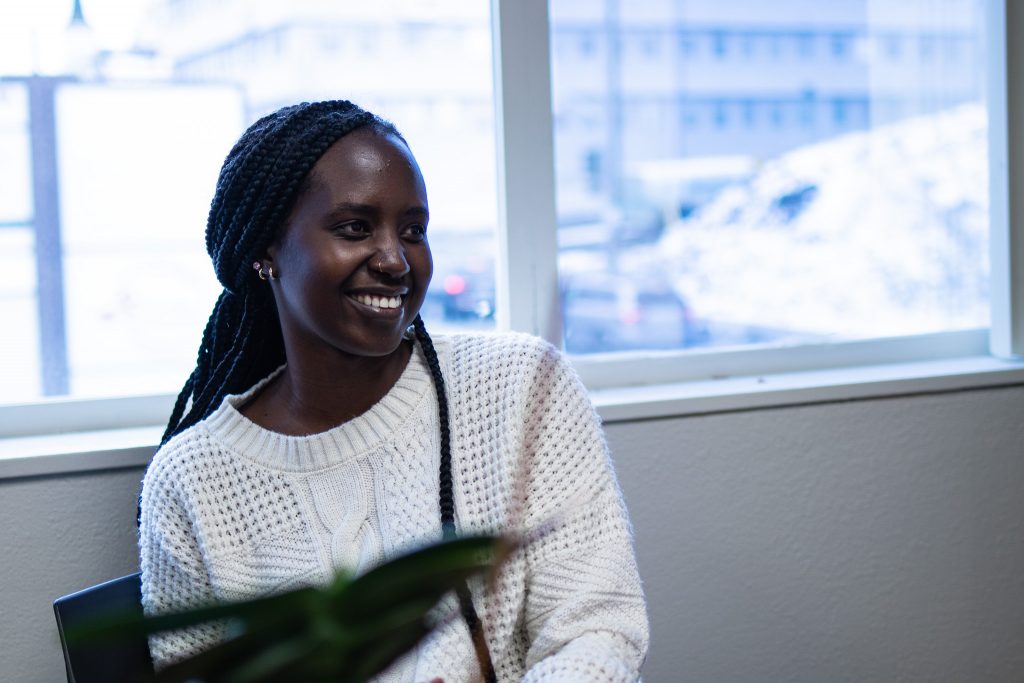
I asked Jeanine if she felt prepared to enter into the public school system when she arrived in Spokane. Bellowing with laughter, she admitted, “Oh no! I was excited!” She continued, “My whole hope was that I could actually go to school here and have something for myself.”
At the beginning of their journey as refugees, Jeanine and her mother never had any hope or expectation that they would come to America. Their hope was to return home, hoping that their country would be safe enough for them to return. Personal and precious belongings were left behind but not abandoned in their hearts. They never gave up the hope that they would someday return home. Eventually, her mother, “the decision-maker,” made the decision to pursue a life apart from their home in Rwanda. Wanting to provide a life of hope and opportunity for her family, she chose a new life in a new country.
Her mother, a kindergarten teacher and pioneer educator in the camp, instilled in Jeanine a love of learning. Love and respect combined with gratitude and awe for her mother, were catalysts for Jeanine to pursue her education. Not something to be debated, she reflected, “I always hoped to God that if I ever got the opportunity, I would do that. I would keep going. Even with my student loans, I am grateful. God is good. I am thankful I am here in this moment in time.”
In contrast to her early years, Jeanine’s successes since coming to America have been overwhelming. Not only did she and her mother become United States citizens, upon graduating from Ferris High School, Jeanine received her Bachelor’s degree in Communications, and her Master’s degree in Social Work, both from EWU. She has been working alongside us at World Relief Spokane for the past four years, selflessly giving back and lovingly serving refugees. She recently received a promotion and will oversee one of the US programs for World Relief’s headquarters.
As our conversation came to a close, I half-jokingly asked Jeanine if we could plan on seeing “The Jeanine Kayetsi Scholarship Fund” for helping those children remaining in the camps sometime in the near future. Her answer left me feeling challenged. In a positive way. She agreed that a scholarship fund would be great, and she affirmed what we already know in our hearts. Any help would be welcomed for the children in the camps. Funding for education, hygiene products for the girls. “If something magical would happen, maybe I could do that.”
I don’t believe Jeanine needs magic. Jeanine is magic.
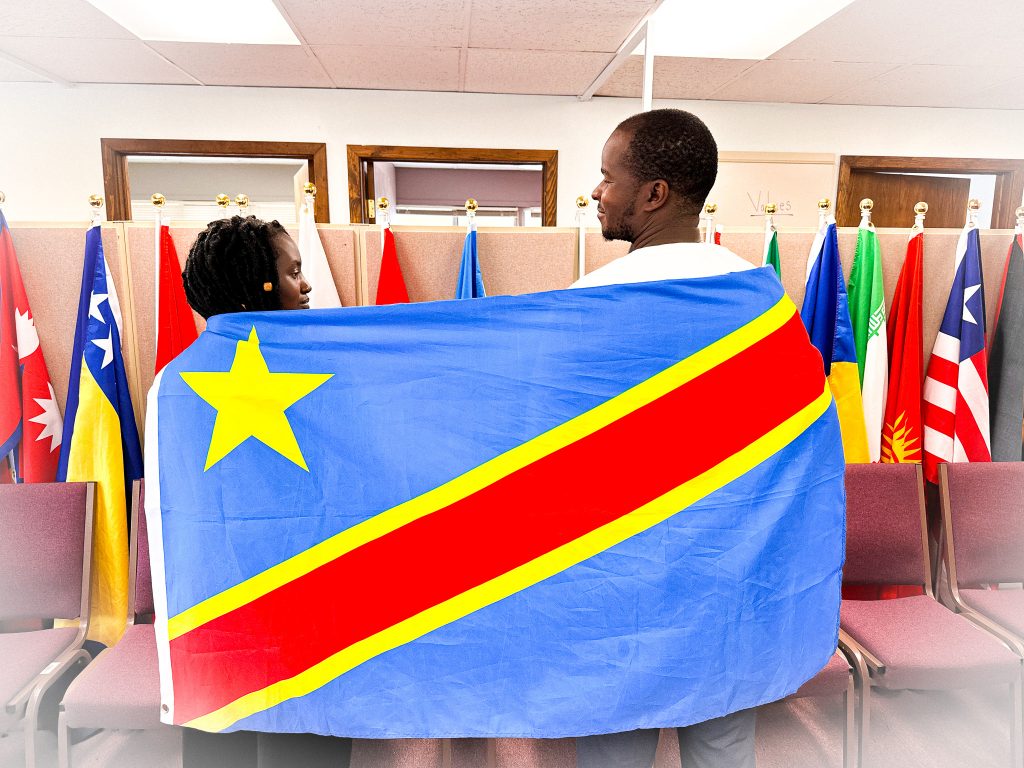
Jesus Didn’t Show Favoritism
Rich Versus Poor
During his short time of public ministry, Jesus was busy. Crowds of 5,000 plus gathered to hear him teach. People brought their sick to be healed, even tearing apart roofs to lower the lame at his feet. People pursued him from one shore to another, trying to anticipate where he would go. He only had three years in which to change the world. Surely, it would make sense for him to speak to the most influential people and make the most efficient use of his time. His disciples seemed to think so. They turned away parents seeking to bring their children. The crowds rebuked the blind man who was calling out to Jesus. With so little time, wouldn’t it make sense for Jesus to be selective about the people with whom he engaged?
But that doesn’t appear to be what he did.
Look at the end of Luke chapter 8. A leader in the synagogue – a powerful, influential man – comes to Jesus to say that his daughter of 12 is very ill. Wouldn’t healing this young woman be a way for Jesus to get in good with the religious leaders? Shouldn’t this be his priority?
Jesus agrees to go and begins to make his way there, but along the way, a woman in the crowd, a woman who has been bleeding for 12 years and has exhausted all her resources trying to find help, reaches out to touch him. The text says she had spent all she had with doctors who only made things worse, so she was poor. On top of that, a woman who was bleeding continually would be considered unclean, an outcast. She had nothing to offer Jesus. And, yet, Jesus not only healed her (“he realized that power had gone out from him he wanted to meet her.”) He stopped in the midst of a large crowd and asked, “Who touched me?” Realizing what had happened, she fell at his feet and told him the whole truth. He healed her. He saw her. He listened to her.
After this delay, friends of the synagogue leader, Jairus, come to tell him it’s too late. His daughter has died. But Jesus says, “Don’t be afraid. Just believe.” He tells the mourners at the house to leave, takes the girl by the hand and says to her, “Arise.”
Jesus did not show favoritism to Jairus, the man with power and wealth, but neither does he scorn him. To the outcast woman and to the religious leader, he gives freely and fully of his time and attention.
“You must not show special favor to poor people or great people,
but be fair when you judge your neighbor” ( Lev. 19:15).
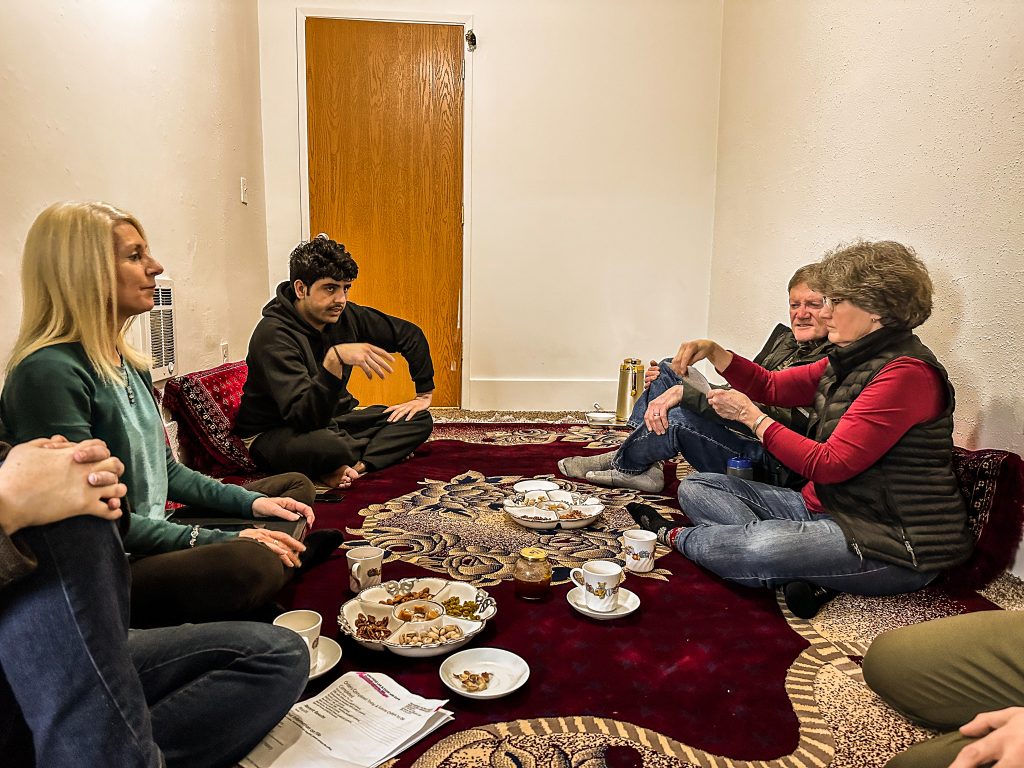
From left to right: Janice, Abbas, Blair and Susan sit in the tea room of Abbas’ third floor apartment hosting his new English Conversation Partners. Afghan’s have an uncanny sense of hospitality which they extend to every person who enter their homes.
Enemies & Strangers
In John chapter 4, Jesus has a long conversation with a Samaritan woman. At the time of Jesus, the Israelites hated Samaritans and called them “dogs” or “half-breeds.” The enmity between the two groups was deep and long-standing, dating back to the time of King Rehoboam (Solomon’s son) and the split between the northern kingdom and the southern kingdom. At the time of the split, the northern kingdom ceased to worship in Jerusalem. They built their own temple in the north. After the northern kingdom was conquered by the Assyrians, the Jews and the Assyrians intermarried and many began to worship the Assyrians’ gods alongside the Jewish God.
Later, the people of the southern kingdom were also carried off to Babylon, and when they returned, many Samaritans opposed them. In other words, they had lots of reasons to hate each other. They no longer considered themselves brothers but enemies.
And, yet, Jesus speaks to the Samaritan woman at the well. Again, he sees her, he knows her and he reveals himself to her, so that she might have living water, so that she might become a child of God.
Jesus again breaks down barriers when he tells the story of the Good Samaritan. An expert in the law wanted to test Jesus, and so he asked him, “What must I do to inherit eternal life?” Jesus replies with a question: “What is written in the law?” The man quotes from Deuteronomy and Leviticus: “Love the Lord your God with all your heart and with all your soul and with all your strength and with all your mind’; and, ‘Love your neighbor as yourself.’”
Jesus says he has answered well. This is true, but then the man asks, “Who is my neighbor?” The Bible says the man wanted to justify himself. He wanted to find a loophole or a rationale that would make him look good.
Jesus then tells the story of the Good Samaritan. His audience would have been expecting a Jew to be the hero of the story, rescuing the man who was beaten and left to die, but much to their consternation, Jesus makes a Samaritan the hero of the story.
At the end of the story, Jesus asks, “Which of these three do you think was a neighbor to the man who fell into the hands of robbers?’
And the man replies, “The one who had mercy on him.”
Jesus told him, “Go and do likewise.”
Questions to ponder:
- Are you more likely to show favoritism to the rich or to the poor?
- Who might Jesus use as the hero of the story in the Good Samaritan today?
World Relief Spokane Applauds Creation of the Welcome Corps, A New Refugee Private Sponsorship Program
CONTACT:
Barbara Comito
bcomito@wr.org
Pinkston Team
wr@pinkston.co
Media welcome: Monday, January 30 at 5 p.m. World Relief Spokane will hold an informational meeting on the Biden Administration’s new Welcome Corps at 1522 N Washington Street. Come learn more about this new program, what it means for refugees and other newcomers, what it means for community members, and how World Relief Spokane plans to support the effort.
This week the State Department launched the Welcome Corps, a new refugee private sponsorship program that will allow everyday Americans to privately sponsor refugees coming to the United States. This new program will expand community support for refugees and also eventually allow private citizens to sponsor refugees they identify abroad to be resettled to the United States. World Relief Spokane applauds this effort and is eager to partner with the U.S. government and the Spokane community to welcome refugees, both through our own refugee resettlement program and the new private sponsorship program.
The Welcome Corps has a goal to mobilize at least 10,000 Americans to partner with members of their communities to help refugees secure initial housing in the U.S., greet them at the airport, enroll children in school, and help adults to find employment. World Relief is committed to assisting the Welcome Corps reach that goal.
“The Spokane community is an extremely welcoming community,” said Executive Director Christi Armstrong. “Over the course of the past 30 years, World Relief Spokane has resettled more than 11,000 men, women and children. We eagerly endorse all the ways the community partners with us to make this a safe home for people fleeing violence and persecution.”
Through the Welcome Corps, groups of at least five individual American citizens or permanent resident adults are able to apply to privately sponsor refugees resettling to the United States. Private sponsors are responsible for independently raising funds to support refugees for their first 90 days in their new community, as well as helping refugees find housing, employment, and connecting them to community services.
For more information on the Welcome Corps, please attend the informational meeting on Monday, January 30, 5 p.m., at World Relief Spokane, 1522 N Washington Street. You can also find a wealth of information on the Welcome Corps website. Further information and education is also available on the World Relief website. We encourage churches, individuals, and other community organizations to explore these resources for more information and reach out with any questions or concerns.
It’s The Right thing To Do
If each one of us reflects on our own stories, we can see God clearly leading and moving in our lives. As I reflect on my own story, I see that I started out focused solely on myself. But then I met the Holy Spirit, and God became real to me. I made a firm decision to follow Him with my life. Then during my college years, I went on a mission trip with Global Outreaches Unlimited because I thought it would be fun. Well, it was fun, but it also changed the direction of my life. My heart for other cultures grew. When my graduate degree in Intercultural Studies required me to do an internship and my top choice fell through, I was placed with World Relief.
As the humanitarian arm of the National Association of Evangelicals, World Relief is an international Christian nonprofit organization with a mission to “empower the local church to serve the most vulnerable.” In the United States we work primarily with refugee resettlement and immigration services. I was amazed that there was an organization that loved two things I loved: the Church and the immigrant. I spent a year learning about World Relief’s ministry to refugees, much of it from refugees themselves. After my internship, I was hired in Spokane, Washington, as a refugee resettlement case manager where I’ve served for the past ten years.
Now that you’ve heard my story, let me tell you a story of one of my refugee friends. Shortly after he was born, his family fled to a neighboring country to escape state-sanctioned infanticide. Though they were told to leave by someone they trusted, they also fled out of fear that their son would be killed. You know this refugee too. His name is Jesus.
When refugees hear Jesus’ story, that He was also persecuted and made to flee to a different country much as they were, they feel known. They realize He understands what they are going through. He has experienced what they are experiencing.
For years a church here in Spokane has hosted a “First Christmas” event for newly arrived refugees. The church throws a party with food and toys for the kids and also shares Jesus’ story. It’s cool to hear about the moments when these newcomers realize that Jesus understands them because He was one of them.
“It’s cool to hear about the moments when these newcomers realize that Jesus understands them because He was one of them.”
Jordan bemis
Each of these refugees has a story to tell. Every story is different, yet every story is similar. The struggles they face are not just the fear and the fleeing; the struggle is also with identity. I have heard over and over again that a refugee doesn’t know who they are. People in their native country didn’t want them and in fact may have tried to kill them. Neither did they have rights in neighboring countries to which they fled. They were not allowed to work, and in many cases, kids were not able to attend school. They were forced to simply wait.
Refugees will tell you that this waiting until someone wanted them was the hardest part of their journey. I know many who had to wait ten, fifteen, even twenty years. I know adults in their twenties who were born in refugee camps; it is the only life they have known.
The average wait for a refugee is seven years. That is a long time to not know how you fit in the world. Can you imagine how hard that wait would be on you mentally, emotionally, and physically?
GOD IS DRAWING THE NATIONS
One of our family’s favorite verses is Isaiah 55:5 (NIV):
Surely you will summon nations you know not, and nations you do not know will come running to you, because of the Lord your God, the Holy One of Israel, for he has endowed you with splendor.
It is God who moves people. It is God who has allowed these refugees to come here. In the process He is drawing them and us to Him. Today there are 27.1 million refugees in the world registered with UNHCR (United Nations High Commissioner for Refugees). On average, only half of one percent of those are resettled to a new country each year. Since I started working at World Relief Spokane in 2012, our office has received 2,401 refugees. That’s a lot of midnight airport pick-ups, home visits, grocery shopping, and enrolling kids in school! But those are just the tasks I am required to do because they are part of my job. It is their stories and the relationships that have impacted our community and me the most.
When I began, one of my first cases was a mom from Afghanistan with four young boys. I spent a lot of time at their apartment because the landlord kept calling me with complaints such as the boys running around breaking off sprinkler heads and making messes in the laundry room. I’d drive to their place, spend time with them, and wonder how they were going to be okay. It was hard for them, but through relationships they built with us and with the community, they got settled and were able to grow and learn.
“The average wait for a refugee is seven years. That is a long time to not know how you fit in the world. Can you imagine how hard that wait would be on you mentally, emotionally, and physically?“
jordan bemis
After five years, I was privileged to see them become citizens of the United States. Now ten years later, those boys are succeeding in college, graduating, and beginning successful careers. One of the boys even joined our staff for a while. Just how far they’ve come since they first arrived to where they are now shows God’s hand on their lives.
There are many misconceptions about refugees, but actual statistics prove that, as in the case of the Afghan family, most eventually benefit their new communities. After the initial investment where we help them find housing and their first jobs, connect them to English classes and volunteers, and help them access healthcare they end up contributing in many ways. They start businesses that employ local people at a faster rate than native born Americans, they help stimulate the economy, and they are willing to do hard, physically demanding work that native citizens might not want to do. Those are just some of the financial benefits. Refugees add value to their new communities in so many other ways as well.
I was recently speaking to a high school group about the subject of refugees, sharing stats about how refugees add value to the United States. I shared that within twenty years of settling here, the amount refugees pay in taxes more than makes up for what it cost the United States to resettle them. I was trying desperately to make a case about why we should help refugees when a girl in the front raised her hand. She said, “Well, all of that doesn’t really matter, does it, because isn’t it just the right thing to do?”
I was speechless, hearing someone so young express truth a whole lot better than I was. Helping refugees is the right thing to do. Micah 6:8 says, “And what does the Lord require of you? To act justly and to love mercy and to walk humbly with your God.” We should minister and partner with the refugee because it is God who is at work in both them and us, and He is wanting us to partner with Him in His mission. It is God who is drawing refugees and us to Him.
It’s the incarnation of Jesus we hear about in the Christmas story that allows everyone, especially refugees, to relate to and know Him. And it is Christ in us through the Holy Spirit who gives us the courage to cross cultures, languages, and religions and to build relationships with refugees. This is a reciprocal relationship, where both the Church and refugees mutually learn from each other. We are blessed by one another as we are both drawn to Jesus.
So how can you make a difference in the life of a refugee?
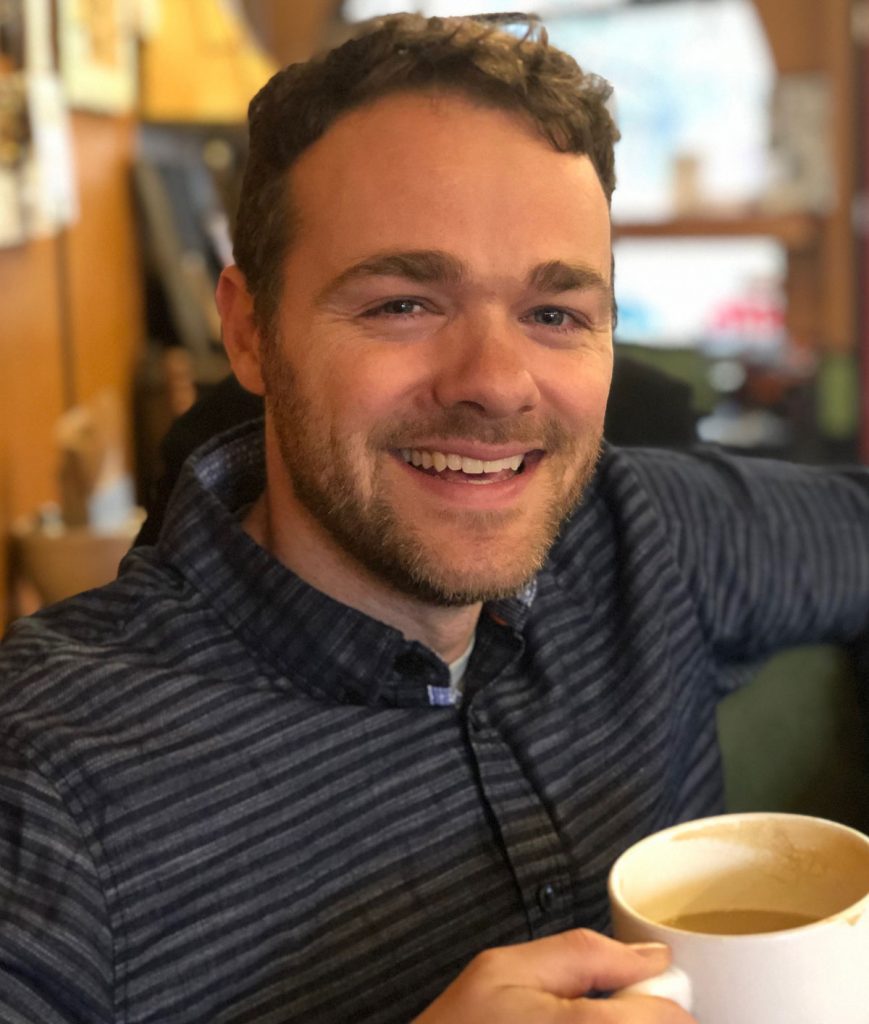
Jordan Bemis is the Resettlement Director at World Relief, where he has worked for ten years. He and his wife, Hannah, have three kids, Asher, Nora, and Abel, and serve at Turning Point Open Bible Church in Spokane, Washington. The family recently adopted a puppy named Maverick.
Please Note: This article was originally published in the Message of the Open Bible.
Leaving Ukraine: The Ochkur Family
The Ochkur Family – Slava, Iryna and three-year-old Olivia – had been working on their immigration to the United States from Ukraine for four years. Slava needed one last stamp on his documents, and then the airline tickets could be issued. They expected to get the call any day. Instead, on February 24, 2022, they woke up in Kyiv to discover that Russia had invaded Ukraine from Belarus just to the north of their home. Slava decided they needed to leave immediately. They packed their car, leaving much behind, and headed for Slava’s parents’ house which was closer to the Polish border and somewhat removed from the fighting.
Slava and Iryna had been working with the US Embassy in Kyiv through the Lautenberg Program, which allows members of religious minorities who are living in countries associated with the former Soviet Union to join their families already in the United States. However, when the unrest began, staff from the US Embassy were evacuated from Ukraine. No one was left to help them with their tickets.
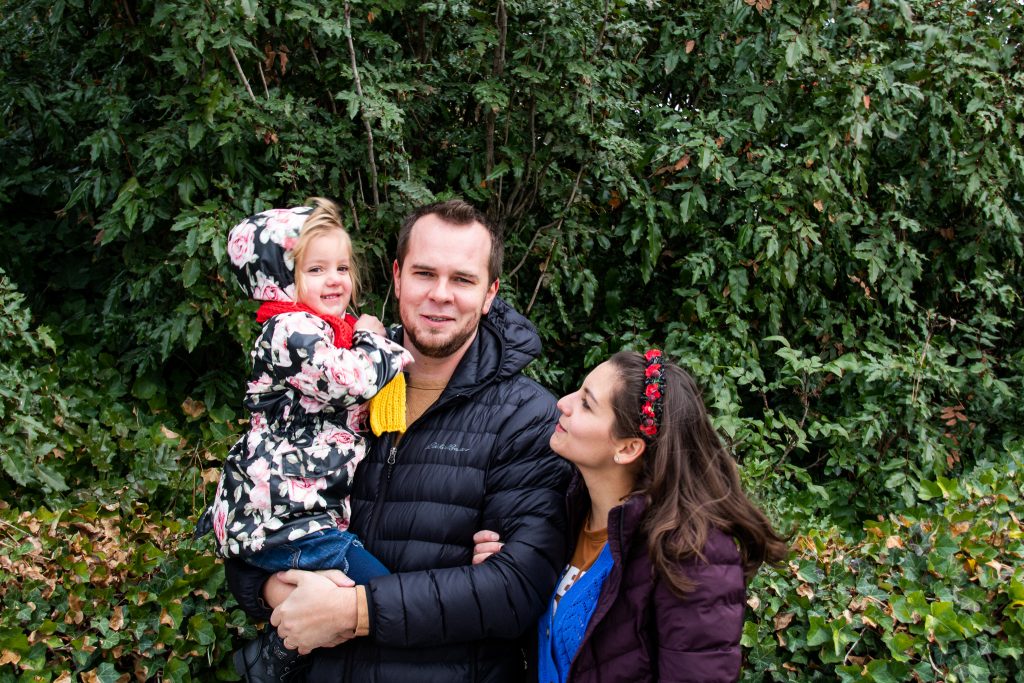
“We stayed at his parents’ and just wait,” Iryna said. “We don’t know how long we need to wait. When we called, they just said, wait until the war is finished or just try to cross the border to another country, and we will try to help you. So we decide to try to move to another country.”
They spent about two weeks living with Slava’s parents in Western Ukraine. “It was a really hard two weeks.”
Slava added: “It was the beginning of the war. Nobody knew what to expect. If Kyiv will be taken or not. If government will still be there or not. And, also, Russia started to bomb, not just Kyiv, but all around Ukraine and even closer to where they were staying.”
Slava’s parents were in the same situation as Slava and Iryna. They were also in the process of immigrating to the US and waiting for tickets. They all knew they needed to cross the border and get to a place of safety.
However, Slava’s missing stamp created a problem. Everyone was able to cross the border except him. Iryna, Olivia and Slava’s parents had to cross into Poland without him, uncertain whether or not he would be able to rejoin them. (When the war began, all men from the ages of 18 to 60 were summoned to join the war effort. Slava had an exception because he was already slated to move to the US, but in war, things do not always go as they should.)
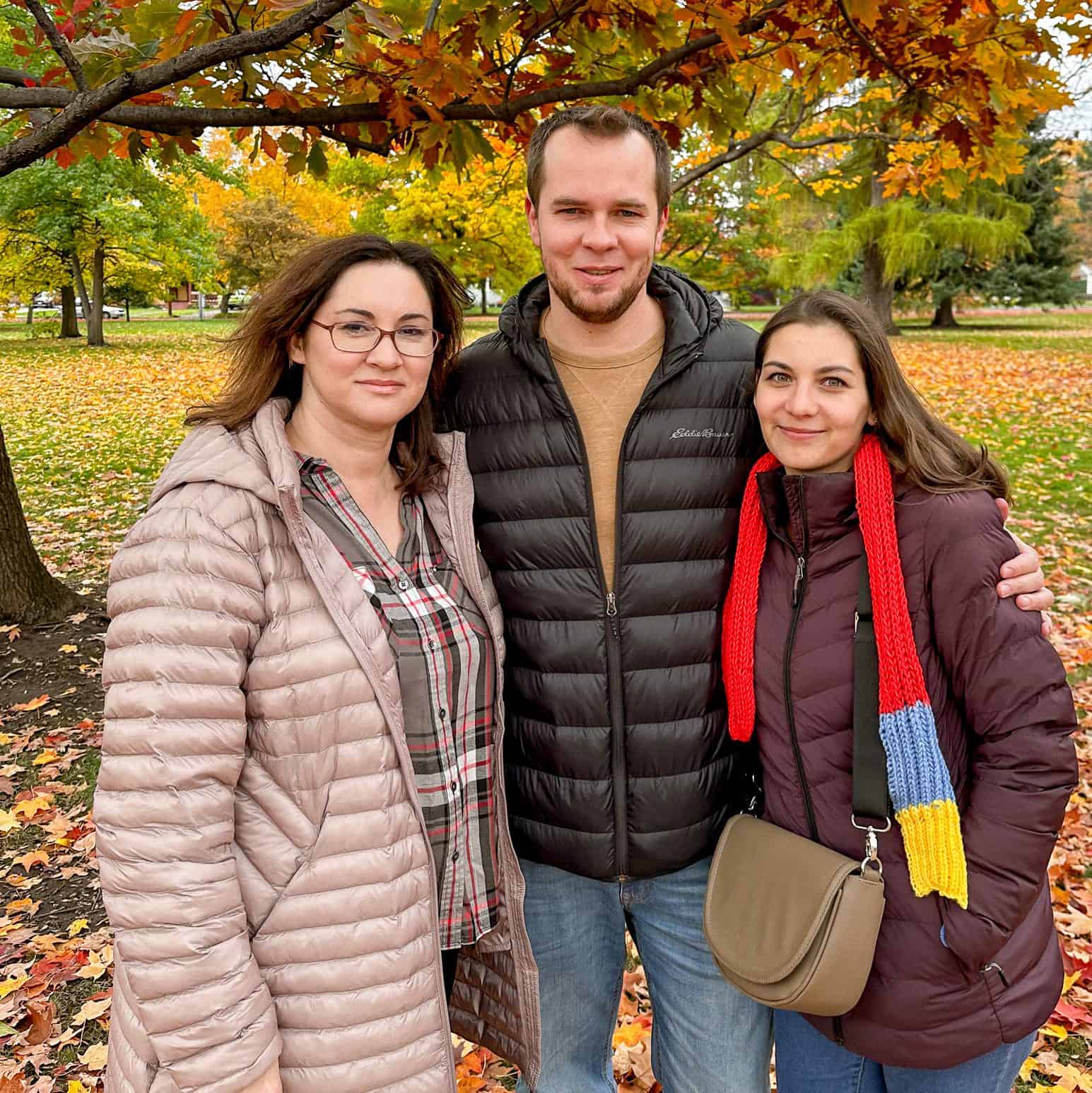
Olga Symonenko was helping to translate during this interview. She also played an important role in the Ochkur’s story. Olga is the mother of World Relief Spokane employee Erika Symonenko, our housing coordinator. Olga had escaped a war in Tajikistan when she was 18 and then in 2008, she had to run again, resettling with her family in Spokane through World Relief. When the war broke out in Ukraine, she and her sister, Katya, who lives in Germany, began to plot how they could help friends and family seeking to flee Ukraine. Olga helped numerous families, including the Ochkurs, get to her sister’s in Germany.
When Olga called about the Ochkurs, Katya and her husband were already headed to Poland to pick up another family. Even though the two families had never met, Katya and Andreas agreed to pick them up, as well. Andreas ended up sleeping in his car at the border for three days, waiting for their arrival, and their church provided a place for the Ochkurs to stay while they waited for word about their immigration to the US, as well as warm clothes since they were not able to pack any.
The great news is that Slava was able to join his parents, Iryna and Olivia after 20 days, but, Iryna explained, that was a hard 20 days. “We can’t move without him to the USA. We must move together.” And they did not know when their tickets and authorization to move would come through.
In the end, the Ochkur Family stayed in Germany for four and a half months. They arrived in Spokane in July, where they were welcomed by Slava’s brother and family. World Relief helped them to find an apartment, and now they are studying English. They have their Social Security numbers and are waiting for work authorization.
Slava said they are doing well. “I am very glad that we are here together, that we can live together. I think it’s really good that we can study right now, very important for us to study right now and be together.”
However, Iryna is concerned about her parents who are still back in Ukraine: “They are still in Kyiv. They were in Kyiv all this time. They have electricity problem. They do not always have lights. We are not sure if they will have heat. The heating system also experiences lots of problems.” She speaks to them by phone, but sometimes the connection is not good.
“My parents, my family, they are in constant danger.” Iryna broke down in tears. Slava explained, “She is very worried about her parents… The last eight months show us that the things we were hoping for, or things we usually hoping for, they may not work, and so, we must rely on God and his providence.”
The Ochkur Family’s story reflects the pain of so many refugees. Even when they reach safety, their hearts are still breaking for the loved ones they left behind.
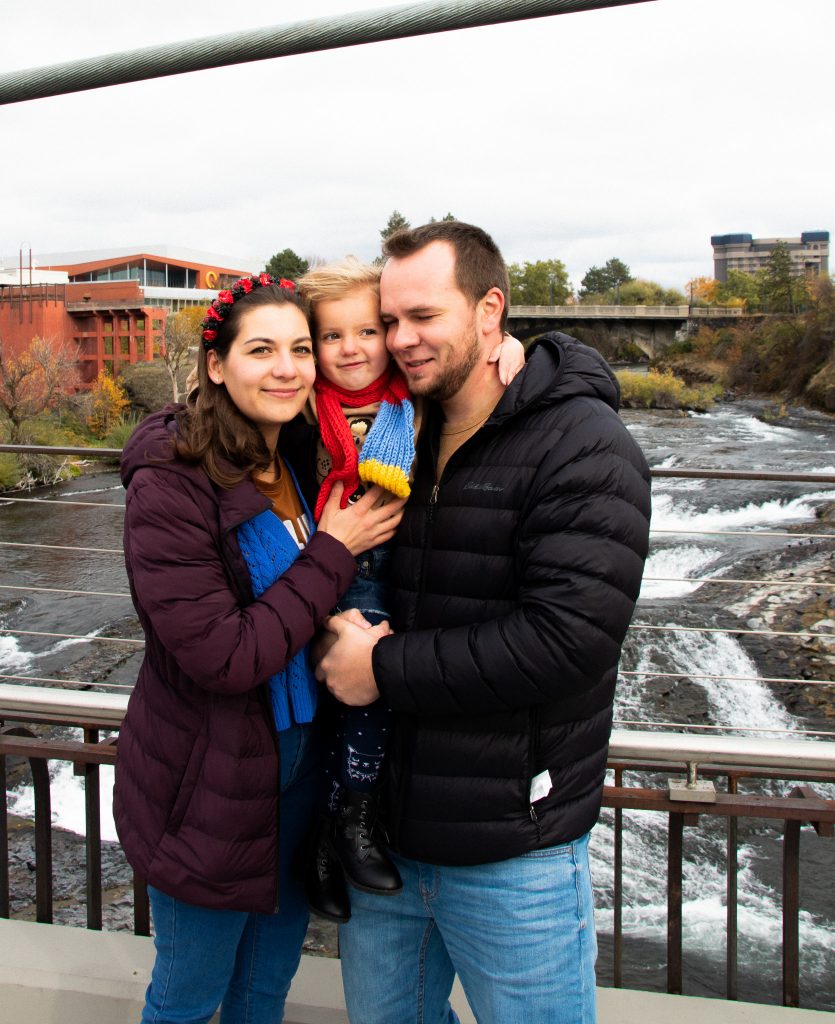
“Your life and my life flow into each other as wave flows into wave, and unless there is peace and joy and freedom for you, there can be no real peace or joy or freedom for me.”
– Frederick Buechner
Who Is World Relief Spokane?
World Relief Spokane is a refugee resettlement agency, working in connection with the local community, to create a welcoming space for people fleeing persecution and violence in their countries of origin.
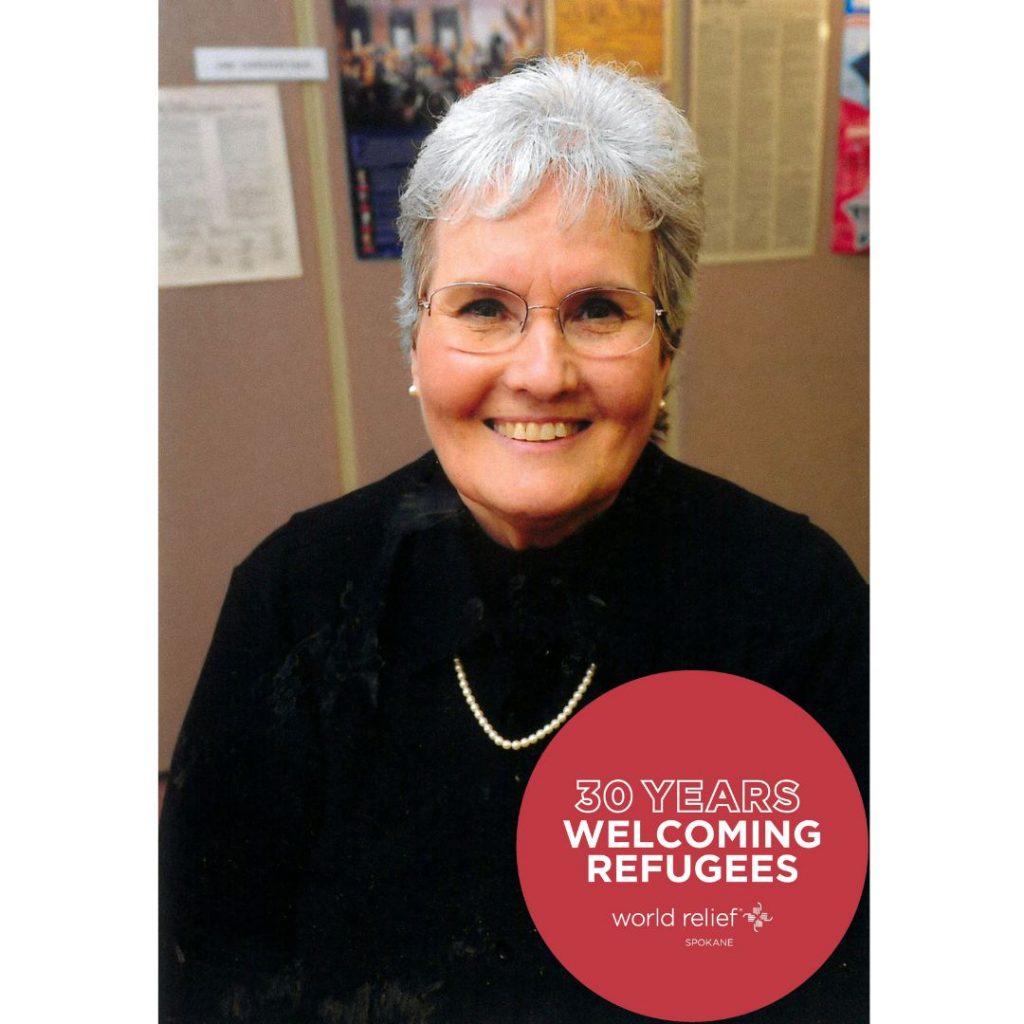
The Spokane office was started in 1992 by Linda Unseth, which means 2022 marks 30 years of resettlement work. In those 30 years, more than 11,000 immigrants have been welcomed to Spokane. Our parent organization, World Relief global, is working to address the causes of mass displacement – extreme poverty, disasters, war, violence and oppression – throughout the world.
One-Stop Shop
World Relief Spokane is a full-service resettlement agency – providing clients with housing assistance, connection to resources, job coaching, and extended case management.
We are the humanitarian arm of the National Association of Evangelicals, and as such, we believe welcoming the stranger is part of our biblical call to love our neighbor and spread the good news of Jesus’ love and mercy. We know that we cannot do this alone, and so, we are committed to engaging the local church, providing them with resources and inviting them to stand alongside refugees seeking to build new lives in Spokane.
Four Core Competencies
RESETTLEMENT – World Relief Spokane works with new arrivals from the time they land at Spokane International Airport and for the subsequent 90 days to help them find housing and to get connected with resources. In partnership with a generous community, we are able to provide new arrivals with all the essentials for setting up a home – furniture, bedding, kitchen wares, etc. The majority of former refugees come with little more than what will fit in a suitcase. Resettlement staff and volunteers connect them with benefits, medical insurance and public transportation; help to enroll their children in school; and connect adults to agencies for English language learning.
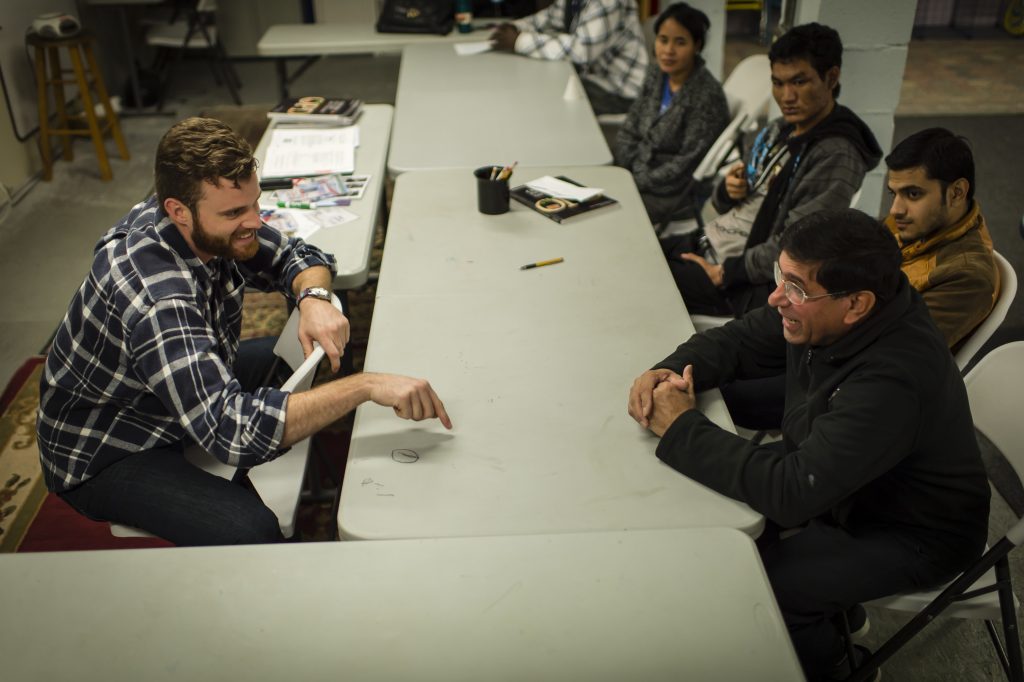
EXTENDED CASE MANAGEMENT – Not all newly arrived refugees can become self-sufficient and independent in 90 days. Many immigrants need more support. Through our Integration and Wellness department, World Relief provides case management to those struggling to get established. Case managers help clients navigate the health care system, legal resources, housing and financial management services, educational services and more. They connect clients with other agencies who provide direct services, while coaching them in accessing services and resources. The goal is to empower clients and connect them with support systems (physical, emotional, social) as they adjust to life in America.
Volunteers are a significant help in walking alongside families as they figure out their tight budgets, work on their language skills, learn the culture, and build a network of support. They often bring a wealth of experience and knowledge and, at the same time, report back that they learned and grew through the experience.
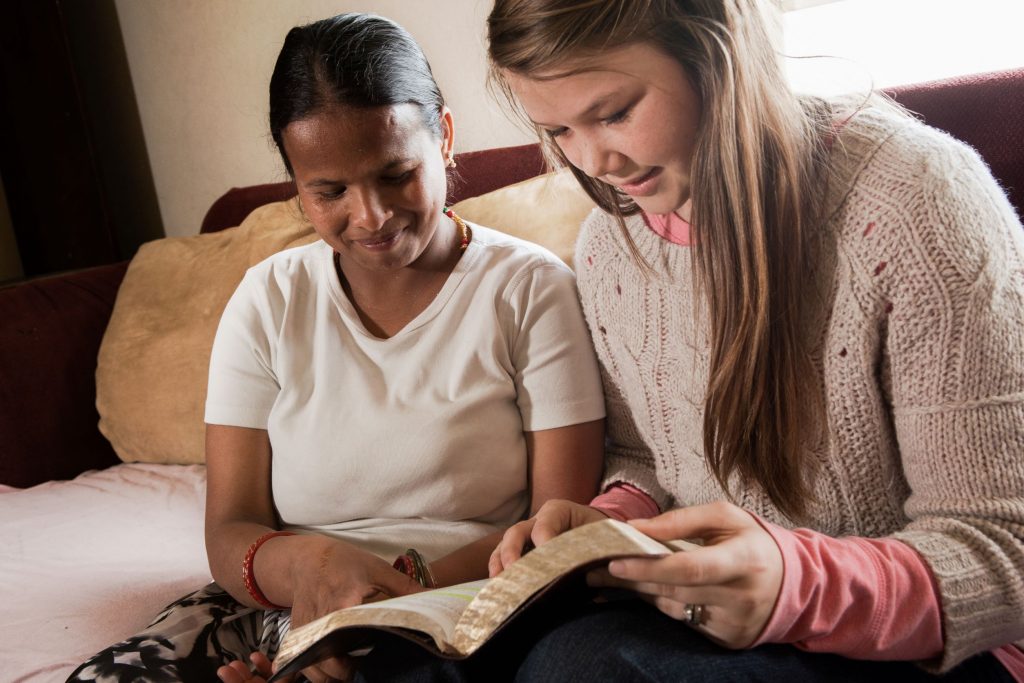
ECONOMIC EMPOWERMENT – By and large, the goal is to help each new immigrant family find employment for at least one adult in the first 90 days. The first job may be an entry-level position while the clients work on their language skills, navigate transportation and develop skills. Clients are welcome to come back at a future date when they are ready to pursue a more career-oriented position. Job Club provides clients with information and mentoring on how to find and maintain meaningful employment.
IMMIGRATION LEGAL SERVICES – Providing legal assistance to pave the way for employment authorization, permanent legal residence and citizenship. [The ILS Department of World Relief Spokane is currently on hold as we search for a new immigration attorney.]
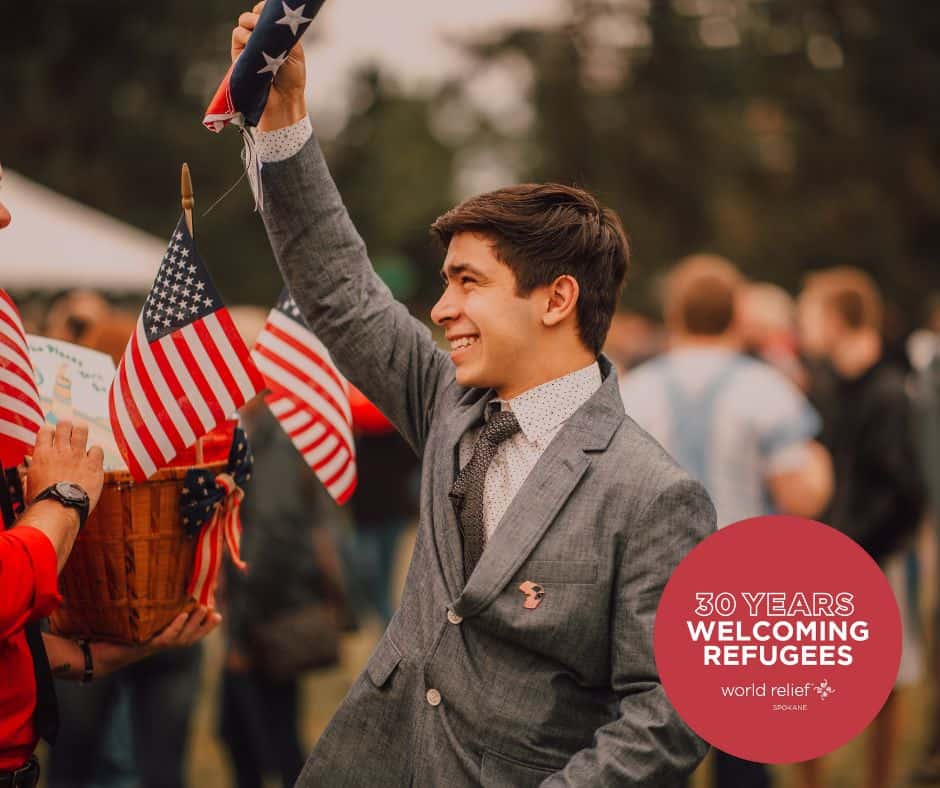
Highlights
Two relatively new initiatives – one spurred by COVID; the other by the large influx of Afghans – are the Community Ambassador program and the Education Center.
COMMUNITY AMBASSADORS provide the bridge between World Relief and the various ethnic communities. Always ready to put on a party or event to foster a sense of belonging and welcome, the Community Ambassador Team play a vital role in two-way communication with their respective communities. They let the communities know the resources and services available at World Relief and throughout the broader community. At the same time, they provide feedback to World Relief staff about the trends, capacities and needs they hear about when working with community members. Melissa Stipek, Friendship Center Manager, refers to the Community Ambassadors as “the fun side of World Relief.”
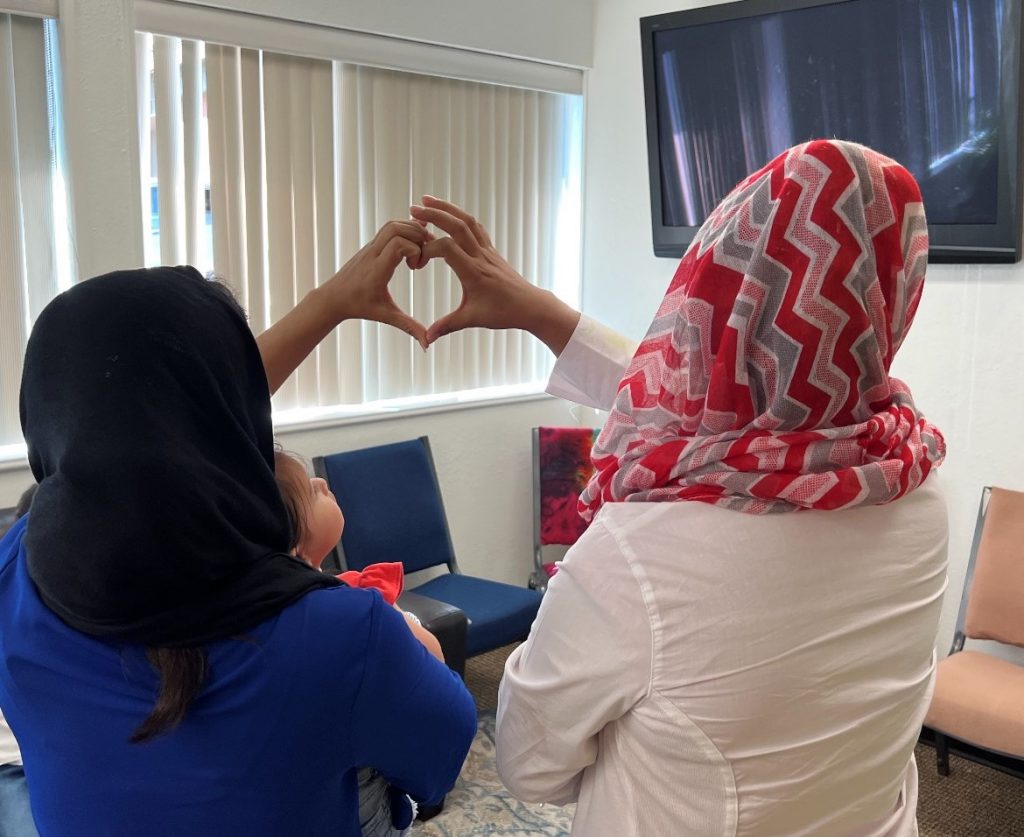
Much of what former refugees are facing is heavy — employment, housing, language studies, cultural orientation. “I believe for people to be able to flourish,” Mely said, “they need to be happy. When people are happy, their mind clears, and they are open to new ideas.”
EDUCATION CENTER – This new endeavor provides intentional education in the areas most needed by clients, helping them to integrate fully into society and become self-sufficient. First two classes: 1) basic computer skills for Afghan women; 2) financial and housing education for Afghan men. More classes are planned for the future.
FUNDING – While the government (local, state and federal) contributes financially to refugee resettlement, their funding does not go the distance. World Relief’s goal in pursuing private funding is to fill in the gaps and create a robust environment of support for our new friends and neighbors.
Become a World Relief partner today!
Bashale and Mwambi: One fateful night leads to resettlement in Spokane
Written by Susan Yem
In 1994, just one week after Mwambi arrived in her new marital home in Democratic Republic of Congo (DRC), her life and her future husband’s life changed forever in terrifying and unexpected ways. DRC is the second largest country in Africa. Although it is rich in natural resources like oil, diamonds and gold, civil war, political corruption and social unrest within its borders, as well as spillover from conflicts in neighboring countries, have led to decades of instability.
Although Bashale’s family was well-to-do and lived in a beautiful house, their wealth and status could not save them from peril. As a judge, Bashale’s father had ruled on a case involving the son of a local military commander who had stolen his father’s gun and used it to murder a man he was attempting to rob. For this crime, the son was sentenced to twenty-five years in jail which incensed the commander.
“He came with five of his soldiers to our house at night and threatened my father,” Bashale recalls. “He broke down our gate, broke into our home, and shot my mother and father, killing both of them.”
Although Bashale, his siblings and Mwambi tried to hide, they were discovered. Mwambi was gang raped by five of the soldiers. Bashale and his older brother were caught by two soldiers, but Bashale’s brother was able to overpower them. The brother was wounded in the melee and died soon after. News of the incident spread quickly, and the remaining family members realized they could not safely harbor Bashale and Mwambi. An uncle advised them to leave the country and they headed to the Meheba Refugee Settlement in Northern Zambia.
“Our lives were very difficult in Meheba,” says Mwambi. “We suffered there because there was a shortage of food. We were not allowed to leave to find work, but we were not given enough food to survive.”
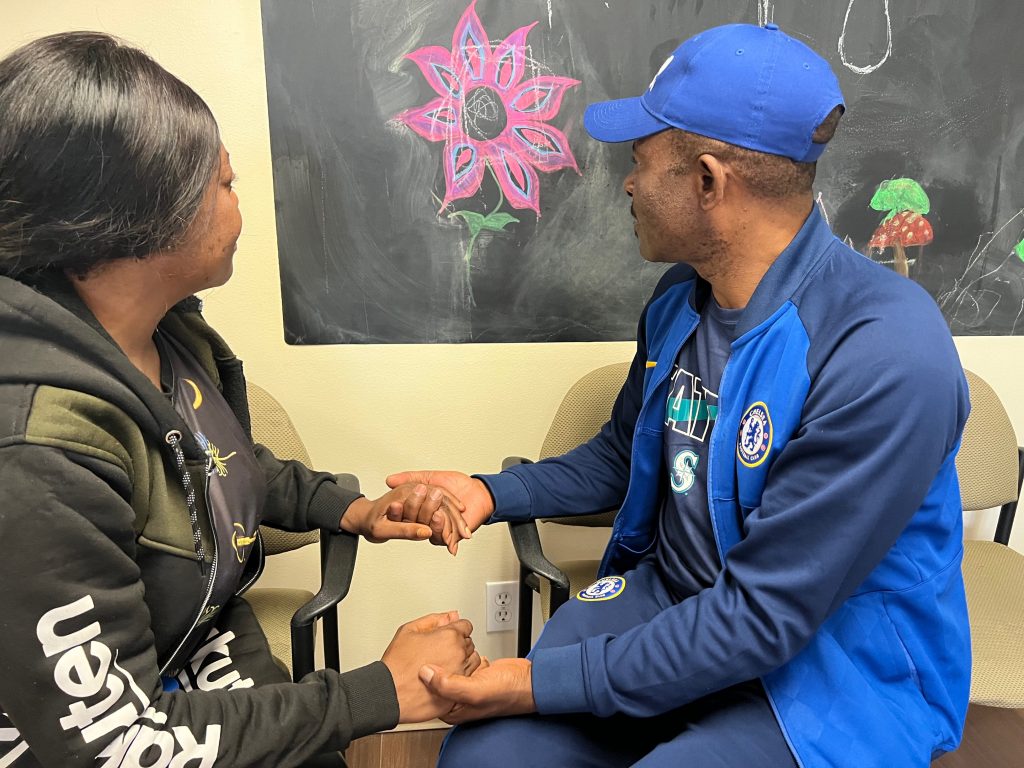
Surviving through prayer
The family decided to take a risk and leave the camp to live in Lusaka, the capital of Zambia. “We were in constant fear of getting caught and being sent to prison because we were living illegally outside the camp.”
As practicing Christians, they were sustained through prayer and trust in God as Bashale says, “We realized the only way we would survive was to pray to God. We fasted; we prayed overnight; we even climbed the mountain to pray.”
Others joined the family in prayer, and eventually two churches were formed which continue to meet today.
After 28 years of waiting, the family was finally notified by UNHCR that they had been accepted for resettlement in the United States. They arrived in Spokane in July. “The people in Spokane have been kind,” says Mwambi. “They accept us, give us shelter, give us food and help us with a lot of things.”
Hopeful for the future
World Relief has assisted the family in establishing themselves in Spokane by finding housing, setting up medical insurance, preparing the kids for school and providing information on how to find jobs. Bashale and Mwambi are currently working with a World Relief caseworker to get the necessary documentation to enable them to work. Bashale hopes to continue to serve God. “I have a passion for working for God here in America,” he says.
Although he does not have happy memories of their lives in Africa, Bashale is reflective about their experiences, “In every situation whether you’re happy, sad, suffering, rich – you still have to praise God for everything.”
Building a just world means coming alongside families like Bashale and Mwambi’s once they’ve reached the U.S., and it means finding lasting solutions to the problems that force families to flee in the first place.
Currently, there are about 30,000 immigrants from DRC residing in the United States. Four hundred live in Spokane. While we work to welcome and help newly arriving refugees and immigrants integrate into life in Spokane, World Relief’s team in DR Congo is addressing the drivers of mass displacement that often force families to flee in the first place.
We live in an interconnected world, and as crises converge, the only way to move forward is together. You can join World Relief Spokane as we build a more just and welcoming world by signing up to volunteer or partnering with us through a financial donation.
Another great way to discover what’s happening at World Relief Spokane is to join us for our Around the Table Gala on November 16. Register here.











